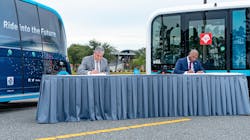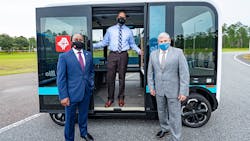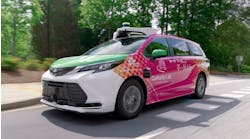MOU to extend JTA’s autonomous vehicle program on FSCJ’s Cecil Center Campus
The Jacksonville Transportation Authority (JTA) and Florida State College at Jacksonville (FSCJ) have signed a memorandum of understanding (MOU) to expand JTA’s autonomous vehicle Test & Learn program on FSCJ’s Cecil Center Campus.
The MOU was approved by JTA’s Board of Directors in May and includes the use of FSCJ’s Commercial Driver’s License Test Track at the Cecil Center, the development of educational curriculum for autonomous vehicles and related technologies, and the eventual launch of an autonomous vehicle circulator on an FSCJ campus.
"We are thrilled to have this opportunity to partner with the JTA to bring the latest in innovation to students in our automotive programs," said FSCJ President Dr. John Avendano. "This exciting initiative will not only support our students' learning and training, preparing them for the jobs of tomorrow, but we know it will also put a spotlight on our community, advancing the job market and the economy as a whole."
The MOU provides the JTA’s Automation Division with the tools to expand the current Test & Learn program to FSCJ’s Cecil Center, home to the college’s Aviation and Commercial Vehicle Driving facilities. Senior leaders in the automation division will also work with FSCJ faculty to create a new curriculum focused on autonomous vehicles and related technology to prepare the workforce of the future. Finally, the MOU lays the groundwork for an autonomous vehicle circulator to operate on an FSCJ campus in the future.
The JTA has been working with autonomous vehicle technology since 2017 as the authority plans to launch the Ultimate Urban Circulator or U2C program, a 10-mile transportation network planned for downtown Jacksonville to replace the Skyway and to expand that system through ground level connections into the surrounding neighborhoods. The U2C comprises of four main phases. A request for proposals for Phase 1 of the project, the Bay Street Innovation Corridor, is schedule to open in September. That phase is funded with the help of a $12.5-million BUILD grant from the Federal Transit Administration.


